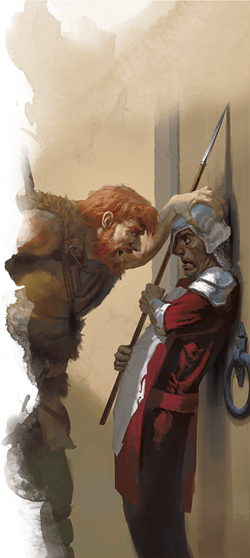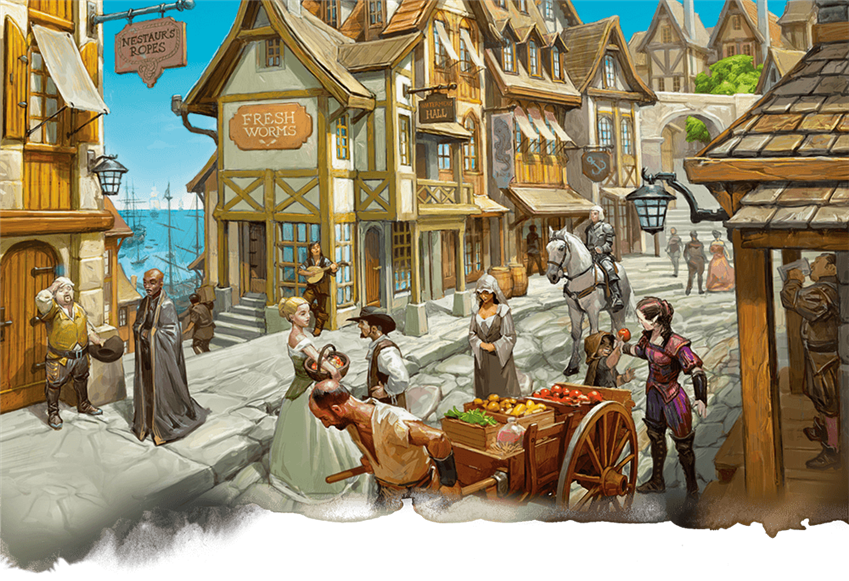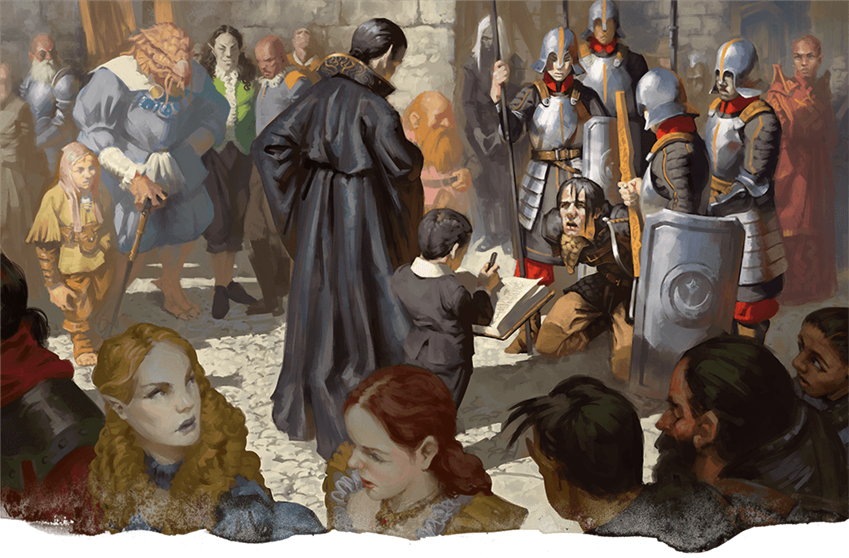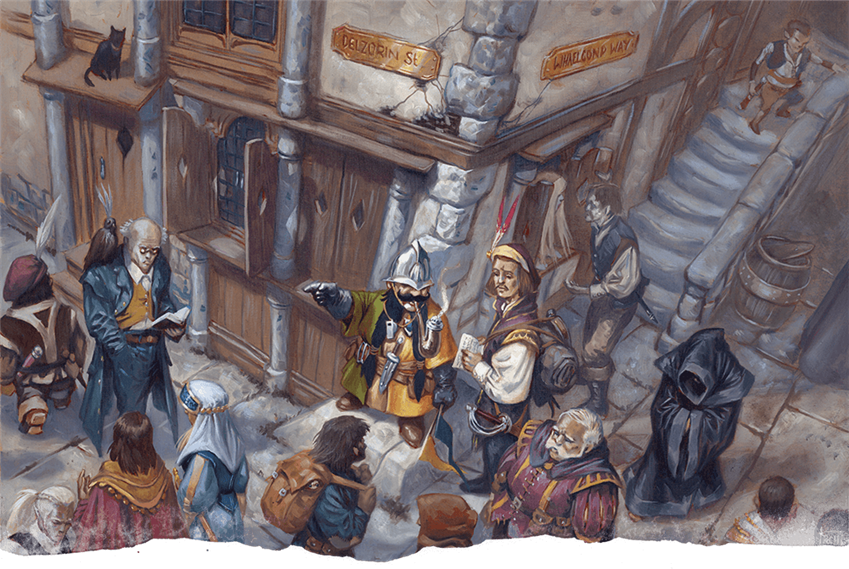 Welcome to Honeyfest! This week’s encounter is Honeyfest Hagglers, a skill-based social encounter in which the characters visit a cheerful spring festival and find themselves in a contest of wits with the savvy merchants hawking their wares. While this encounter is set in the midst of a spring festival known as Honeyfest, it can also be used in any situation in which a character wants to haggle down the price on a rare or magical item.
Welcome to Honeyfest! This week’s encounter is Honeyfest Hagglers, a skill-based social encounter in which the characters visit a cheerful spring festival and find themselves in a contest of wits with the savvy merchants hawking their wares. While this encounter is set in the midst of a spring festival known as Honeyfest, it can also be used in any situation in which a character wants to haggle down the price on a rare or magical item.
Social Encounter: Honeyfest Hagglers
This social encounter can be encountered by characters of any level. However, high-level adventuring parties that have access to powerful magic such as dominate person may be able to trivialize this encounter without customization.
Every spring, the festival of Honeyfest gathers commoners, merchants, performers, and scoundrels from all across the land. Many of the merchants who gather at Honeyfest are local village bakers and artisans, but some are traveling antiques dealers and purveyors of truly wondrous items. Characters with a keen eye for quality—or who are capable of discerning an honest merchant from a charlatan—may decide to visit one of these merchants’ stalls and browse for interesting magical items.
Once the characters decide to ask about prices, though, they’ll probably find that these items are just too rich for their blood. If they don’t feel strongly about the items, then they might just let it go and move on. But if even one of the characters takes a shine to even one of the items on display, then it’s time to haggle! These merchants like to set their prices high in order to fool rich adventures into overpaying for their wares, and some of them even enjoy haggling, like a hunter enjoys the thrill of stalking a wild animal through the forest.
Haggling for the best price can be resolved through a straightforward roleplaying scene, perhaps interspersed with the DM calling for a few Charisma checks with an arbitrary, ad hoc DC attached. But there’s another way. A good haggling session can be just as thrilling and high-stakes as a combat encounter—because just like a fighter may use a longsword to battle with orcs, that same fighter can engage with a merchant in a battle of wits. This verbal repartee is represented by a skill challenge in which the interested character or another member of their party uses their Charisma-based skills to negotiate a better price.

Encounter Summary
The characters walk through the bustling streets of a small city in the throes of Honeyfest, inundated with the smells of flowers and festival food, and dazzled by the vibrant colors of the dozens of flapping banners and jam-packed market stalls. If the characters don’t investigate the marketplace of their own volition, an eager merchant stops them in the street and invites them to his stall, promising rare treasures and magnificent curios.
Once the characters investigate his stall, they find a lot of shiny junk—and a few valuable treasures. If they try to buy and don’t like the merchant’s stated price, they can try to haggle him down by engaging in a skill challenge using Charisma-based skills.
Encounter Start
The characters are in the midst of a crowded marketplace. Read or paraphrase the following:
“Happy Honeyfest!” reads a vibrant banner stretched across the threshold to the city’s marketplace. The city’s main thoroughfare is nearly thirty feet wide, and you are nevertheless packed in, shoulder-to-shoulder with hundreds, maybe thousands of people. All are enjoying the delights of the spring festival, and the air is thick with the scent of flowers, fried festival food, and—less pleasantly—hundreds of sweaty festivalgoers.
The sides of the thoroughfare are crammed full of market stalls, food stands, jugglers, tumblers, and musicians with coin-filled hats in front of them. Most of these market stalls are filled with cheap souvenirs, but it seems like some may have rare antiques, stylish artisanal jewelry, and other valuable goods.
If the characters are interested in the stalls, one of them can make a DC 13 Wisdom (Insight or Perception) check to find a merchant that seems reputable or a stall that seems to have rare and valuable goods.
If the characters fail this check or decide to explore another part of the festival, they encounter a stall selling festival food made from fried dough covered in honey and powdered sugar, and then a juggler juggling clubs while doing a one-handed handstand. After they explore the festival for a time, a hawkish dwarf merchant with a waxed mustache and wearing a floppy cap approaches them and says, “Why I declare, you must be adventuring folk! If you have gold in your pockets from your latest tomb raid, then I have some truly outstanding merchandise for folk in your unique line of work. Won’t you come back to my stall and take a look?”
Examining the Merchant’s Wares
The merchant, named Jonabar Kilroy is a mountain dwarf noble who was stripped of his title long ago. Now, he and his two halfling assistants (Dirk Dimriddle and Tully Stonethrow, both guards), travel the world, buying and selling rare goods and worthless trinkets. They don’t like to scam people per se, but it’s easier to make money peddling snake oil than unearthing real magical artifacts.
A character that examines the merchant’s wares can make a DC 10 Wisdom (Insight) check to find a rare bauble. This trinket might be an expensive spell component like a ring with a 50 gp diamond (used to cast chromatic orb), a gold necklace inlaid with a 100 gp pearl (used to cast identify), or a pair of platinum rings, each worth 50 gp (used to cast warding bond). The merchant sells each of these items for 150% their worth.
A character that succeeds on this DC 10 Wisdom (Insight) check by 5 or more finds a magic item; roll once on Magic Item Table F to determine which item this is. The merchant sells it for 750 gp. If the character succeeds on this check by 10 or more, they discover two items from Magic Item Table F.
At Higher Levels: If the character succeeds on this check by 15 or more (a result of 25 or higher), they find a magic item randomly determined from Magic Item Table G, in addition to two magic items from Magic Item Table F. The merchant sells this item for 7,500 gp.

Skill Challenge: Haggling Down the Price
Characters that find a rare item, but don’t want to pay full price, can try to haggle. If the characters don’t seem aware that they can haggle, the merchant can wink and say, “Aye, the price is a bit high, ain’t it? I suppose I could part with it for a wee smidge less—if you’re willing to haggle with me, o’course.”
If the characters are willing to haggle, the skill challenge begins. The merchant sits down with a broad smile on his face, and opens his arms wide, inviting the haggler to make a counteroffer. When a character makes an offer, ask them to describe how they make the offer, and to make a Charisma check. The player also chooses a skill proficiency to pair with this check: choosing from Deception, Intimidation, Performance, or Persuasion.
If the check has a result of 10 or higher, the price of the item is reduced by 10% of its original price. If the check has a result of 15 or higher, the price of the item is reduced by 15% of its original price, and so on. If the check has a result of 9 or lower, the check fails. The merchant calls his final offer when the item’s price is reduced to 50% of its original price, or after the character fails three checks in total, whichever comes first. If multiple characters want to haggle, their successful checks all contribute to the item’s total price reduction, and their failed checks all contribute towards the three total failures needed to end the skill challenge.
Once the merchant gives his final offer, he absolutely refuses to haggle any further. He may consider bartering for other valuable items instead of trading for currency, if you wish.
At Higher Levels: If the characters are at least 5th level, increase the required result of all checks by 2. If the characters are at least 11th level, increase the required result of all checks by 4. If the characters are at least 17th level, increases the required result of all checks by 6. Use your judgment when adjusting the required check results; legendary merchants or extraplanar antique sellers have excellent judgment, but high-level players should not have to perform exceptionally well to haggle with an average shopkeeper.
Sample Skill Descriptions
If your players aren’t sure how to describe haggling with their skill of choice, you can give that player an example of that skill in use. Your player can use this example if they wish, but try to encourage them to be creative.
Charisma (Deception). “I boast about false accomplishments to try to convince the merchant that his reputation will soar if people learn that he sold a magical item to me—since I will probably use it to slay a dragon or some other legendary feat.”
Charisma (Intimidation). “I look the merchant dead in the eye and flex my muscles. I say that most folk know better than to say no to me.”
Charisma (Performance). “I turn around to face the crowd near the merchant’s stall and declare, ‘Look! I just found a magical artifact in this fellow’s stock!’ I turn back to the merchant with a sly grin and say that I just drummed up some free business for him, so how about you drop the price a bit?”
Charisma (Persuasion). “I pout my lip and make puppy dog eyes at the merchant. I say that I’d love to buy this item—it might even save my life someday—but I just don’t have the gold to do it. You don’t want to see me die out there just because I didn’t have the one magical trinket that could save my life… would you?”

Haggling Complete!
Once the characters are done haggling, they can choose to either buy the item at the price they’ve haggled the merchant down to, or give up and try somewhere else. Either way, they’ve just used their characters skills and their roleplaying abilities in tandem to try and solve a problem. They’ve just become more invested in your campaign world and maybe even earned a cool magic item in the process.
If your characters live in a world where magical items are frequently bought and sold in major cities, they might enjoy returning to this skill challenge again and again after adventures, in order to trade their hard-earned gold for some new magic items. You could also try inverting this skill challenge to let your characters to try haggle for a higher price when selling treasure from their latest dungeon delve. Also, if the characters end up using this skill challenge over and over again, you can shake it up by allowing them to make Charisma checks modified by non-Charisma-based skill proficiencies, or by allowing the characters to use their Charisma-based skill proficiencies with other ability scores, like making an Intelligence (Performance) check to impress a scholarly scroll merchant.
Did you like this adventure? If you want to read more, take a look at the other encounters in the Encounter of the Week series! If you're looking for full adventures instead of short encounters, you can pick up the adventures I've written on the DMs Guild, such as The Temple of Shattered Minds, a suspenseful eldritch mystery with a mind flayer villain (for 3rd level characters). My most recent adventures are included in the Gold Best Seller Tactical Maps: Adventure Atlas, a collection of 88 unique encounters created by the Guild Adepts, which can be paired with the beautiful tactical poster maps in Tactical Maps Reincarnated, recently published by Wizards of the Coast.
 James Haeck is the lead writer for D&D Beyond, the co-author of Waterdeep: Dragon Heist and the Critical Role Tal'Dorei Campaign Setting, the DM of Worlds Apart, and a freelance writer for Wizards of the Coast, the D&D Adventurers League, and Kobold Press. He lives in Seattle, Washington with his partner Hannah and their feline adventurers Mei and Marzipan. You can usually find him wasting time on Twitter at @jamesjhaeck.
James Haeck is the lead writer for D&D Beyond, the co-author of Waterdeep: Dragon Heist and the Critical Role Tal'Dorei Campaign Setting, the DM of Worlds Apart, and a freelance writer for Wizards of the Coast, the D&D Adventurers League, and Kobold Press. He lives in Seattle, Washington with his partner Hannah and their feline adventurers Mei and Marzipan. You can usually find him wasting time on Twitter at @jamesjhaeck.








-
View User Profile
-
Send Message
Posted Apr 8, 2019Awesome! I love that this encounter is not just based on combat. I can't wait to use this!
-
View User Profile
-
Send Message
Posted Apr 8, 2019Aaaah this is wonderful! I love role playing; it's one ofof t defining elements of the game, and encounters like these are where a character can grow into their role. 😁
-
View User Profile
-
Send Message
Posted Apr 8, 2019I can't wait to run this in my desert themed playtest. Always pumped to see your new work. Awesome job!
-
View User Profile
-
Send Message
Posted Apr 8, 2019I can use this and keep reflavoring it, and use it multiple times.
-
View User Profile
-
Send Message
Posted Apr 8, 2019Going to use this during Waterdeep: Dragon Heist (Spring) in Waterdeep. Thanks for the encounter!
-
View User Profile
-
Send Message
Posted Apr 8, 2019Honeyfest? Better keep a careful watch for bears in odd hats.
-
View User Profile
-
Send Message
Posted Apr 8, 2019Lol but that's honey con
-
View User Profile
-
Send Message
Posted Apr 9, 2019Honeyfest, eh? What specific date does the festival take place on? Is this something you came up with for this article or is it a celebration that exists elsewhere?
-
View User Profile
-
Send Message
Posted Apr 9, 2019Fantastic world building tool here, great job I will use this in my game next week. I used the Fools gold last week turned out fantastic they cleverly discovered the prank before they entered the entrance.
-
View User Profile
-
Send Message
Posted Apr 9, 2019Thanks for this, James! My wife, a friend, and I just talked yesterday about how we've enjoyed this series of articles. She has adapted and used the one with the drider, he is starting and using the one with the conversational dragon, my brother recently used "The Dying Unicorn", and I've got plans to use "The Haunted Cornfield". Great stuff.
-
View User Profile
-
Send Message
Posted Apr 9, 2019Honey heist that stuff up
-
View User Profile
-
Send Message
Posted Apr 9, 2019These encounters are definitely great.
I'd love to see one done on 'alternate ability' skill checks, for example:
A center for higher learning among young nobles is holding an open day to show off to the visiting world how it can claim to be the center of the civilized world.
Among the encounters can be:
Endurance Running (constitution) athletics, or hurdles (dexterity) athletics.
Debate Tournaments Intelligence (Persuasion) or Charisma (History) because it's not just knowing the facts all the time but applying them in a convincing way.
Bull Riding: Strength (Animal Handling)
and many more to extol the wonders of how skill proficiencies don't need to be tied to the same ability every time.
-
View User Profile
-
Send Message
Posted Apr 9, 2019I cannot speak to if the celebration exists elsewhere, but the great thing about D&D - it's adaptable. This can run this on any day of any campaign, it could be adapted to be held any season and it could even be called something different for a different group of people :).
-
View User Profile
-
Send Message
Posted Apr 9, 2019I just whipped up a magic item that would help balance this encounter for high level players:
https://www.dndbeyond.com/magic-items/596741-merchants-watchdog
-
View User Profile
-
Send Message
Posted Apr 10, 2019I don't quite understand why you would use Wisdom (Insight) over Intelligence (Investigation) or Wisdom (Perception).
-
View User Profile
-
Send Message
Posted Apr 10, 2019Same here!
-
View User Profile
-
Send Message
Posted Apr 10, 2019Wonderful encounter!
-
View User Profile
-
Send Message
Posted Apr 10, 2019Excellent encounter and ways to highlight the use of non-combat abilities!
My primary comment (and there truly is no way to say this in an electronic format without sounding like an ass so I apologize) is the focus of the celebration, honey, and the time that the festival takes place, spring. Honey needs to be harvested in the late summer after the bees have had time to build it up over the growing season (summer). If you harvest too early you'll kill the hive. https://www.mybeeline.co/en/p/when-to-harvest-honey.
To enhance the verisimilitude, just move this to the late summer or early fall (before the freeze) and you'll not get odd looks from any would-be zymurgists.
Greg Volz
Natural Twenty Games
-
View User Profile
-
Send Message
Posted Apr 10, 2019Charisma (Intimidation) "I want to see a manager right now. This was on the clearance rack."
-
View User Profile
-
Send Message
Posted Apr 11, 2019This is brilliant. There's so little material out there that actually breaks down how to handle a social encounter. I love this.